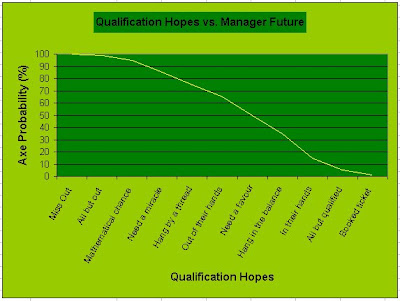 As chairmen up and down the country succumb to peer pressure and begin sacking their managers, the Managerial Merry-Go-Round (MMGR) steps up a gear. Far enough into the season for clubs to have had a "disappointing run of results", yet early enough for supremos to "act now, in the best interests of the football club", we are in prime hunting season. Unemployed managers with patchy CVs are placed on red alert as vacancies appear at struggling clubs, while desperate chairmen draw up shortlists to find "the right man" for the second time in six months. Meanwhile, bookmakers close their betting as speculation mounts over possible replacements.
As chairmen up and down the country succumb to peer pressure and begin sacking their managers, the Managerial Merry-Go-Round (MMGR) steps up a gear. Far enough into the season for clubs to have had a "disappointing run of results", yet early enough for supremos to "act now, in the best interests of the football club", we are in prime hunting season. Unemployed managers with patchy CVs are placed on red alert as vacancies appear at struggling clubs, while desperate chairmen draw up shortlists to find "the right man" for the second time in six months. Meanwhile, bookmakers close their betting as speculation mounts over possible replacements.The Angle... presents the third edition of the MMGR:
- David O'Leary - Arguably now the new holder of George Graham's former position as chief resident of the MMGR, O'Leary is now sniffing around the Republic of Ireland job. With the requirements of an international manager even more of a mystery than a club boss, O'Leary stands a very good chance.
- Stuart Pearce - Currently occupying the most cushty of managerial positions - England Under-21s, where it's all about the performance, not the result and where absolutely nobody cares if they win or not. May well eventually be selected as the right man at a struggling Premier League club who need an injection of fighting spirit, grit and determination.
- Paul Jewell - Having taken a break for several months, Jewell is presumably now itching to get back into the game. Now being linked with a return to Wigan, which would contravene an unwritten rule of football - never go back.
- Chris Coleman - Fairly likely to be quietly ushered out of the historically revolving door at Real Sociedad when he fails to gain promotion back to La Liga, Coleman will return to these shores with his managerial reputation inexplicably replenished. The pitiful number of British players and managers plying their trade on the Continent means that those who do are immediately assumed to be far more talented than they are, regardless of how utterly average they may have been in the first place.
- Steve Cotterill - A classic example of a tough-talking young English manager who has turned out to be a complete no-mark. After not proving himself in the slightest at Stoke City and hilariously failing to keep Sunderland afloat in the Premiership alongside Howard Wilkinson in 2003, Cotterill recently left Burnley by mutual consent. Will hopefully be bringing his brand of overeager touchline finger-pointing to a lower division side in his next role.
- Graeme Souness - Having rapidly lost his only managerial quality - pure terror - Souness may have to make do with becoming the new George Graham for football broadcasting purposes, only without the successful managerial career behind him. Will quite simply not succeed in any managerial position he happens to land. Also perhaps O'Leary's main challenger for MMGR longevity in the future.
- Martin Jol - The amiable Dutchman will find it very difficult to shake off his reputation as quite a nice bloke who suffered the ruthless axe from his previous club, despite being popular with most football fans. Jol is quite clearly, therefore, the new Claudio Ranieri.
- Gary Megson - The Angle... try our best to keep up to date. To help us achieve this, we occasionally take the plunge and bravely assume some things are probably going to happen anyway. This is not one of those occasions, however, as we are actually quite certain of Megson's future demise at Bolton. The MMGR may as well have a seat made with Megson's face depicted on the front, especially for him. Doomed.
- Martin Allen - Another young English manager who appears to be allowed to prioritise humorous interview quips over actual managerial prowess (see also Holloway, Ian), Allen undid any supposedly promising work at Brentford and MK Dons by getting himself employed by Leicester City.
- Peter Reid - Considered in the last edition to be disappearing from view, Reid seemingly wants to supplement the wages Leeds United are probably still paying him - although the only signs of his potential return are being linked to the Leicester job, reportedly part of an enticing shortlist alongside Graeme Souness and fellow MMGR veteran Joe Royle. Speaking of whom...
- Joe Royle - Last seen dusting down his copy of The Idiot's Guide to a Relegation Battle in preparation for his interview with Milan Mandaric at the Walkers Stadium.
- Chris Hutchings/Sammy Lee - Those pesky No. 2s just won't give up, will they? Before reverting to their natural role as conemen, these two will get one more bite at the managerial cherry - possibly at a Championship club that is allegedly geared towards Premier League football.
- John Gregory - Ah, yes. Not quite ready to untuck those tracksuit bottoms from his socks just yet, Gregory will surely attempt to gain employment at yet another club he visited during his journeyman playing career. In which case, that list now leaves Northampton Town or Brighton to be ticked off/left to pick up the pieces. On the other hand, perhaps Gregory has realised that being a former fans' favourite means bugger all when you try and inflict your managership upon them.
Adam.











